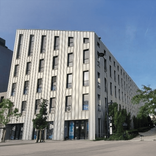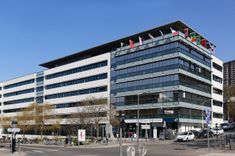Manager de projets nationaux et internationaux des organisations Bac+5 International Sustainable Development
Yes you can ! Co-construct international development projects in accordance with the sovereignty of the territories
Adopt a responsible understanding of the development of international projects.
The new initiatives must surpass neo-colonial relationships with miserable images and paternalistic attitudes that are widespread between the West and the rest of the world.
3A believes that training is a fundamental axis for a sustainable development.
Niveau
Bac + 5
Diplôme
Level 7 professional certification, "Manager of national and international projects for organizations" issued by APTIM under n°39386, registered with the RNCP by France Compétences decision of 16/12/2019, NSF code 310.
Admission
Examination
Rythme
Initial
- Alternance
Campus
Bordeaux
Lyon
Paris Courbevoie
Toulouse
Rentrée
Rentrée de Septembre 2026
Yes you can ! Co-construct international development projects in accordance with the sovereignty of the territories
Adopt a responsible understanding of the development of international projects.
The new initiatives must surpass neo-colonial relationships with miserable images and paternalistic attitudes that are widespread between the West and the rest of the world.
3A believes that training is a fundamental axis for a sustainable development.
Durée de
2
ans
Niveau
Bac + 5
Diplôme
Level 7 professional certification, "Manager of national and international projects for organizations" issued by APTIM under n°39386, registered with the RNCP by France Compétences decision of 16/12/2019, NSF code 310.
Admission
Examination
Rythme
Initial
- Alternance
Campus
Bordeaux
Lyon
Paris Courbevoie
Toulouse
Rentrée
Rentrée de Septembre 2026
Objectives
In a global and increasingly complex world, the Manager of national and international projects for organizations accompanies structures/institutions to position themselves on an open transnational market and to develop projects that generate the creation of values and/or humanistic principles (internationalization of solidarity).
The Manager of national and international projects for organizations therefore occupies a strategic position within organizations. In this sense, he/she is called upon to advise and support the leaders of organizations in the development of growth, transformation, adaptation and change management strategies.
3A promotes a responsible comprehension of the development of international projects. The new initiatives must surpass neo-colonial relationships with miserable images and paternalistic attitudes that are widespread between the West and the rest of the world.
3A believes that training is a fundamental axis for a sustainable development.
OBJECTIVES
- Strengthen theoretical knowledge and practical know-how in order to innovate in the fields of ethical and international development
- Develop international activities with geopolitical and cultural challenges
- Be able to identify an international opportunity and choose a business development strategy
- Be able to work with multicultural and multidisciplinary teams
- Systematically take into account the needs of local populations to build sustainable development projects
The Manager of national and international projects for organizations therefore occupies a strategic position within organizations. In this sense, he/she is called upon to advise and support the leaders of organizations in the development of growth, transformation, adaptation and change management strategies.
3A promotes a responsible comprehension of the development of international projects. The new initiatives must surpass neo-colonial relationships with miserable images and paternalistic attitudes that are widespread between the West and the rest of the world.
3A believes that training is a fundamental axis for a sustainable development.
OBJECTIVES
- Strengthen theoretical knowledge and practical know-how in order to innovate in the fields of ethical and international development
- Develop international activities with geopolitical and cultural challenges
- Be able to identify an international opportunity and choose a business development strategy
- Be able to work with multicultural and multidisciplinary teams
- Systematically take into account the needs of local populations to build sustainable development projects
Programme
The first and second years of the MBA program train 3A students to define an organization’s development strategy, design a suitable product or service, manage operational and financial flows, and lead multicultural teams. To achieve this, they study an in-depth foundation in management sciences (strategic management, prototyping, human resources, financial analysis, digital communication, project financing, and more).
No equivalences - no gateways
No equivalences - no gateways
Field of competence 1 : Definition of the development strategy of the organization
Field of competence 2: coconstruction with the stakeholders (products / services / processes)
Field of competence 3 : financial and activity flow management
Field of competence 4 : National and international project management
Field of competence 5 : multidiciplinary and multicultural team management
What job after the MBA International Sustainable Development ?
Achieving sustainable development goals is a fundamental part of business growth. Nowadays, it has become clear that no company can ignore global warming or increasing inequalities in the world. For example, if nothing is done, climate change will disrupt all of the Earth’s biomes, which will have unfathomable consequences on companies’ activities. This is why businesses have started to hire professionals who can implement internal solutions to answer those challenges.
After your MBA International Sustainable Developement, you can start working for any kind of company, in your home country or abroad. Aside from international businesses, you may also find a job in structures such as consulting agencies, governments or NGOs. There are a lot of different missions in this sector, such as improving internal processes to reduce their environmental impact, finding reliable international partners whose activities respect human rights and the environment.
The need for businesses to embrace this new paradigm still needs to be improved. Global warming and pollution in general require strong and fast actions as soon as possible. By following this MBA, you will be in a position to bring radical changes to your companies’ activities.
Your career prospects can be divided between those that are directly related to sustainable development and jobs that aren’t but need to take it into account in their daily activities.
After your MBA International Sustainable Developement, you can start working for any kind of company, in your home country or abroad. Aside from international businesses, you may also find a job in structures such as consulting agencies, governments or NGOs. There are a lot of different missions in this sector, such as improving internal processes to reduce their environmental impact, finding reliable international partners whose activities respect human rights and the environment.
The need for businesses to embrace this new paradigm still needs to be improved. Global warming and pollution in general require strong and fast actions as soon as possible. By following this MBA, you will be in a position to bring radical changes to your companies’ activities.
Your career prospects can be divided between those that are directly related to sustainable development and jobs that aren’t but need to take it into account in their daily activities.
Admission requirements
To apply, candidates must meet one of the following requirements:
Entry into Year 4:
Admission by entrance examination for applicants holding a validated Bac+3 (Bachelor’s degree/Licence, Bachelor, etc.) or having obtained 180 ECTS credits.
Access timeframe: the timeframe may vary from 3 days to more than 9 months (this corresponds to the period between the time you apply and the time you start the programme).
- Hold a Level 6 or Level 7 qualification (French qualifications framework) in a field relevant to the professional certification;
- Hold a degree awarding 180 ECTS credits in a field relevant to the professional certification;
- Have at least three years of professional experience in a position of responsibility;
- Hold a foreign qualification awarding 180 ECTS credits, after assessment through the equivalency process, in a field relevant to the professional certification.
Entry into Year 4:
Admission by entrance examination for applicants holding a validated Bac+3 (Bachelor’s degree/Licence, Bachelor, etc.) or having obtained 180 ECTS credits.
Access timeframe: the timeframe may vary from 3 days to more than 9 months (this corresponds to the period between the time you apply and the time you start the programme).
Subject Areas
- Anthropology of development
- Geopolitics and development
- Import and export logistics
- International team manager
- International alternative development..
Teaching methods used
- Teaching methods used
- École 3A’s teaching approach is based on innovative methods that combine theoretical classes with practical experience, with the single aim of supporting your personal and professional development while building your autonomy and commitment. You will be supported by permanent faculty, trainers, and industry experts who will share both their knowledge and professional experience.
- Preparatory modules (refresher courses)
To ensure you start the programme in the best possible conditions, École 3A offers preparatory modules before the start of the academic year on key topics: humanitarian action, anthropology, Social and Solidarity Economy (SSE), accounting and management, and marketing. - A blended programme
École 3A’s programme includes on-campus classes, online learning, and blended learning sessions, as well as autonomous learning time designed to support collaborative projects and practical activities. - Project-based learning
École 3A encourages initiative-taking, critical thinking, and the search for innovative solutions through group work. By working on real-life projects, you will develop transferable skills such as collaboration, creativity, problem-solving, and time management. Each project is designed to connect theoretical knowledge with practical applications, making learning more engaging and meaningful. - Encouraging curiosity and engagement
École 3A, along with the 13 schools in the Compétences & Développement network, offers online modules and volunteer civic initiatives to broaden your outlook (AI, inclusion, civic engagement, volunteering, etc.). These activities allow you to earn digital skills badges that you can later showcase in your professional journey.
Skills
The program focuses on building active listening and empathy, a strong ability to bring people together, charisma, teamwork, and organizational skills.
Assessment methods
- Group synthesis report
- Individual or group oral assessments
- Individual case studies
- Group simulation or role-play oral assessments
- Final dissertation/thesis
Training costs
For each admission year, you must submit an online application via our 3A website and complete written and oral assessments.
Tuition fees for the upcoming intake:
Full-time (initial) track:
€9,950* in Year 4
€10,200 in Year 5
Work-study (alternance) track:
As part of a work-study program, tuition fees are fully covered by the host company and its Skills Operator (OPCO). The learner therefore has no out-of-pocket costs.
For the host company, the training cost is:
€11,500 in Year 4
€11,500 in Year 5
The program is also available via VAE (Validation of Acquired Experience / validation of prior learning) and is eligible for the CPF (Personal Training Account).
It is possible to validate one or more skill blocks.
*Net of VAT if the program is 100% self-funded. In all other cases (e.g., CPF, Pôle emploi/France Travail, company funding, regional funding, etc.), VAT applies (20%).
Tuition fees for the upcoming intake:
Full-time (initial) track:
€9,950* in Year 4
€10,200 in Year 5
Work-study (alternance) track:
As part of a work-study program, tuition fees are fully covered by the host company and its Skills Operator (OPCO). The learner therefore has no out-of-pocket costs.
For the host company, the training cost is:
€11,500 in Year 4
€11,500 in Year 5
The program is also available via VAE (Validation of Acquired Experience / validation of prior learning) and is eligible for the CPF (Personal Training Account).
It is possible to validate one or more skill blocks.
*Net of VAT if the program is 100% self-funded. In all other cases (e.g., CPF, Pôle emploi/France Travail, company funding, regional funding, etc.), VAT applies (20%).
Key figures of the programme
- Success rate (Class of 2024): 80% (Apprentices 82%), 193 successful candidates out of 235 presented
Further study continuation rate (Class of 2024): 4.3% at 6 months (69 respondents)
- Professional integration rate (class 2024): 82% on 6 month
- Occupational integration rate (class 2024): 69% on 6 month
- Interruption rate (class 2024): 2.93%
- Satisfaction rate (class 2023): 75.80% (apprentices 79.20%)
Data on campus indicators is available on request.
Further study continuation rate (Class of 2024): 4.3% at 6 months (69 respondents)
- Professional integration rate (class 2024): 82% on 6 month
- Occupational integration rate (class 2024): 69% on 6 month
- Interruption rate (class 2024): 2.93%
- Satisfaction rate (class 2023): 75.80% (apprentices 79.20%)
Data on campus indicators is available on request.
Certification
Level 7 professional qualification ‘Manager of national and international projects for organisations’ registered on the RNCP under number 39386 by decision of the Director General of France Compétences dated 19/07/2024, awarded by APTIM, NSF code 310. Lien vers la fiche RNCP
Registration in the National Register of Professional Certifications (RNCP) allows a professional certification to be placed within the European scale of training levels.
This registration is decided by a France Compétences commission, an organization of the Ministry of Labor.
For more information, you can visit the website France Compétences.
Registration in the National Register of Professional Certifications (RNCP) allows a professional certification to be placed within the European scale of training levels.
This registration is decided by a France Compétences commission, an organization of the Ministry of Labor.
For more information, you can visit the website France Compétences.

Continuation of course
Integration into professional life.
Career opportunities
- Export manager
- Fair Trade Sector Manager
- International development manager
- Micro-credit adviser
- International team management consultant
Disability Inclusion
To ensure the promotion and development of programs available for people with disabilities, École 3A is committed to the following measures:
General contact
handicap@competences-developpement.fr
Lyon Campus
Tamara GALLOIS – tamara.gallois@ecole3a.edu
Toulouse Campus
Mélissa MALDONADO – melissa.maldonado@ecole3a.edu
Rennes Campus
Katia VALOIS – k.valois@st-exupery.org
Paris Campus
Thomas GARRES – thomas.garres@ecole3a.edu
Bordeaux Campus
Mélodie STRAUBE – melodie.straube@ecole3a.edu
- All campuses are accessible for people with disabilities
- All campuses have equipment adapted to people with disabilities
- There is a person of contact for better support of people with disabilities before, during and after the program.
- A charter for progress in welcoming people with disabilities has been established and spread to all École 3A campuses to raise awareness among the network staff and students.
General contact
handicap@competences-developpement.fr
Lyon Campus
Tamara GALLOIS – tamara.gallois@ecole3a.edu
Toulouse Campus
Mélissa MALDONADO – melissa.maldonado@ecole3a.edu
Rennes Campus
Katia VALOIS – k.valois@st-exupery.org
Paris Campus
Thomas GARRES – thomas.garres@ecole3a.edu
Bordeaux Campus
Mélodie STRAUBE – melodie.straube@ecole3a.edu
MBA International Sustainable Development FAQ
What are the key differences between the MBA International Sustainable Development and a traditional MBA in International Business?
What kind of companies and organizations typically hire graduates from this MBA?
What are the career prospects for graduates who want to work in NGOs or international institutions?
How does the program balance theoretical knowledge with practical experience?
What are the main challenges in international sustainable development that this MBA prepares students to tackle?
I chose this school because I wanted multidisciplinary subjects that wouldn’t bore me—and that could turn my activism into real skills so that, later on, I can contribute something meaningful to society.
At 3A, I learned to always prioritize the project’s best interests: to set my ego aside and face challenges, even when you know they’ll come up at certain stages.
École 3A also showed me that it’s possible to work towards a fairer world while holding a paid job. Commitment is, above all, a deep conviction that guides our everyday choices.
Most of society’s challenges are deep-rooted, complex, and multifactorial problems that take time to solve—and everyone can play a part.
Sonia B., Class of 2025
I joined École 3A as part of a career change. After earning my high school diploma at 30 and starting out in sales, I decided to move into humanitarian management for NGOs, with the goal of working in the field and managing projects.
Geoffrey L., Class of 2025
I was looking for a school that combines theory, hands-on practice, and real field insight—and I found École 3A.
This school matched my expectations perfectly: a program that doesn’t just teach theoretical concepts, but immerses us in the realities of the humanitarian sector.
What impacted me most was the group work in almost every class, and the chance to learn from highly experienced guest speakers with very diverse backgrounds and concrete field experience.
They’re not just people talking about something they’ve never lived through—these are professionals who have travelled, worked on the ground, and truly understand the humanitarian sector.
That’s exactly what I needed. I grew in confidence: I used to be afraid of reaching out to others and working in groups, and the school helped me open up and believe in myself more.
Roxana A., Class of 2025
I chose École 3A because it matches my career goal—working in international solidarity—but above all, it aligns with my values.
It’s a school that puts people first and supports us in taking action for a better world. At 3A, I strengthened my critical thinking, deepened my commitment to solidarity, and discovered how much you can learn from others—and from the people you help.
3A has made me more positive and full of hope. Why? Because when you see humanitarian crises and wars around the world, you can feel powerless and wonder whether our actions can really change anything.
Meeting students who share the same values is reassuring and makes you want to keep moving forward: you tell yourself, “Okay, we’re not alone—we keep going!” It’s only together, through our actions—no matter how small—that the world will change.
Maryline D., Class of 2025





